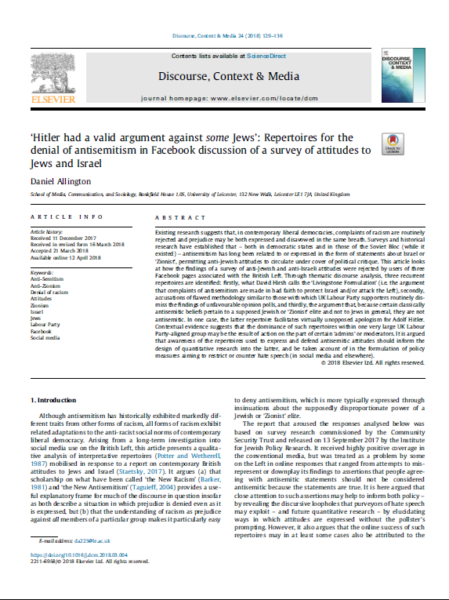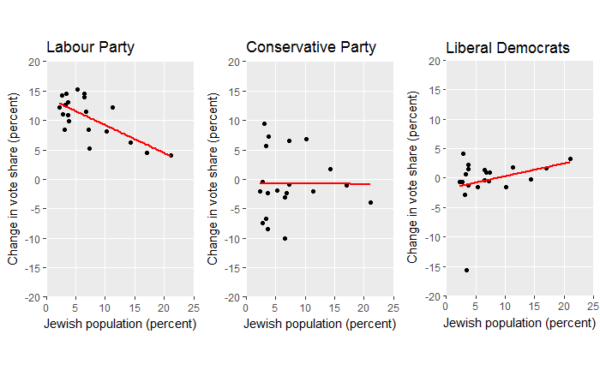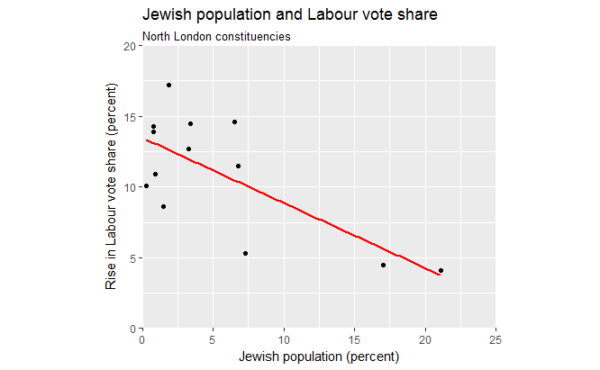My article ‘ “Hitler had a valid argument against some Jews”: repertoires for the denial of antisemitism in Facebook discussion of a survey of attitudes to Jews and Israel’, which was published online in April this year, has now appeared in the August issue of Discourse, Context & Media. It explains the background to the antisemitism crisis that has now engulfed the Labour Party leadership, then analyses some of the ways in which Labour supporters deny the existence of antisemitism before looking at how the largest unofficial Labour Party Facebook group makes the problem worse by readily expelling those who challenge antisemitism but only expelling antisemites for extreme transgressions.
Tag: antisemitism
‘Hitler had a valid argument against some Jews’: repertoires for the denial of antisemitism in Facebook discussion of a survey of attitudes to Jews and Israel (manuscript draft)
This manuscript has been accepted for publication in the peer-reviewed academic journal, Discourse, Context & Media. By agreement with the publisher, it can be distributed on this website. For offline reading, a PDF copy is available for download (although if you wish to share it with others, please direct them to this page rather than sending the file directly). EDIT (13 April 2018): The version of record is now available online via ScienceDirect at https://doi.org/10.1016/j.dcm.2018.03.004 ahead of print publication. EDIT (4 August 2018): The article has appeared in the August issue of Discourse, Context & Media (vol. 24), and is available online at the same address (although now with correct pagination).
Author: Daniel Allington, University of Leicester
Journal: Discourse, Context & Media
Received at editorial office: 11 Dec 2017
Article revised: 16 Mar 2018
Article accepted for publication: 21 Mar 2018
Article available online via ScienceDirect: 12 April 2018
Article available in print: 21 July 2018
Bibliographic reference: Allington, D. (2018) ‘ “Hitler had a valid argument against some Jews”: Repertoires for the denial of antisemitism in Facebook discussion of a survey of attitudes to Jews and Israel’. Discourse, Context, and Media 24: 129-136.
Abstract
Discourse analytic research suggests that, in contemporary liberal democracies, complaints of racism are routinely rejected and prejudice may be both expressed and disavowed in the same breath. Historical and quantitative research has established that – both in democratic states and in those of the Soviet Bloc (while it existed) – antisemitism has long been related to or expressed in the form of statements about Israel or Zionism, permitting anti-Jewish attitudes to circulate under cover of political critique. This article looks at how the findings of a survey of anti-Jewish and anti-Israeli attitudes were rejected by users of three Facebook pages associated with the British Left. Through thematic discourse analysis, three recurrent repertoires are identified: firstly, what David Hirsh calls the ‘Livingstone Formulation’ (i.e. the argument that complaints of antisemitism are made in bad faith to protect Israel and/or attack the Left), secondly, accusations of flawed methodology similar to those with which UK Labour Party supporters routinely dismiss the findings of unfavourable opinion polls, and thirdly, the argument that, because certain classically antisemitic beliefs pertain to a supposed Jewish or ‘Zionist’ elite and not to Jews in general, they are not antisemitic. In one case, the latter repertoire facilitates virtually unopposed apologism for Adolf Hitler. Contextual evidence suggests that the dominance of such repertoires within one very large UK Labour Party-aligned group may be the result of action on the part of certain ‘admins’ or moderators. It is argued that awareness of the repertoires used to express and defend antisemitic attitudes should inform the design of quantitative research into the latter, and be taken account of in the formulation of policy measures aiming to restrict or counter hate speech (in social media and elsewhere).
Keywords: anti-Semitism; anti-Zionism; denial of racism; attitudes; Zionism; Israel; Jews; Labour Party; Facebook; social media
Antisemitism and the misuse of statistics
Last week saw the publication of a very strange report entitled ‘How serious is the threat of antisemitism in Britain today?’ and published on the website of the controversial Jewish Voice for Labour group. It was written by Alan Maddison, an ‘independent strategist’ and associate member of the group with a history of previous attempts to discredit claims of antisemitism. Maddison begins by noting some recent media headlines about antisemitism, and then proceeds to set out the following position:
A review of the latest evidence, presented here, suggests that these headlines are unnecessarily alarmist. The pro rata risks for assaults are lower for Jewish people than for those from other races or religions. The increase in antisemitic hate crimes reported to the police is around half that reported for other victim groups. Finally, a Jewish person is 50 times more likely to be the victim of a general assault than one motivated by antisemitism
Having set out this position, Maddison promises to ‘review the latest evidence behind these more reassuring statements, and place antisemitic hate crime in a broader perspective’. Unfortunately, the way in which he does so discredits the entire enterprise, and calls into question Jewish Voice for Labour’s motivations in publishing his report.
I’ll go through Maddison’s arguments one by one.
Continue reading “Antisemitism and the misuse of statistics”
‘The usual suspects’: Euler diagrams of letter signatories as a practical application for set theory
The day before the 2017 Labour Party Conference in Brighton, Labour Vision published an essay in which I argued that responsible non-Jews on the Left should take note of majority Jewish opinion, and not ignore it in favour of tiny minority groups on the fringes of the Jewish community whose opinion happens to be more convenient for Leftists. What actually happened at the conference is history — and quite unpleasant history at that (for details, I recommend reading both Marcus Dysch’s overview of events and David Collier’s eyewitness account). There’s much more to be said on the topic, and I’ll get around to saying some of it before long, but for now, I’d like to revisit the odd little centrepiece of my Labour Vision essay: the analysis of signatories to four letters opposing action against antisemitism. (tl;dr: There are very few Jews who are committed anti-Zionists, but the anti-Zionist movement needs them in order to maintain the impression of not being anti-Jewish, so a lot of the same names get recycled between different open letters to the press. Also, a tutorial on how to make Euler diagrams in R. Something for everyone?)
Imaginary (Jewish) friends
It is an article of faith for many on the British Left that measures to combat left wing antisemitism are in reality measures to combat Labour Party leader Jeremy Corbyn: attempts promoted by the fiendish ‘Israel Lobby’, and opposed by Jews. Yes, by Jews. You know the Jews I mean: maybe not the Jews you’ve actually met, but, as Chaminda Jayanetti put it, ‘the Good Jew[s] – the Perfect Jew[s]. The Manic Pixie Dream Jew[s]. The Jew[s] to be put on a placard as evidence of how Not All Jews support Israel.’ There’s a certain kind of Leftist who needs those Jews.
Did Jewish Labour voters turn towards the Conservative Party or the Liberal Democrats in 2017?
Last week, I published a blog post showing that North London constituencies bucked the national trend by swinging less heavily towards Labour than might otherwise have been expected. I have since repeated the analysis, looking at changes in votes for the Labour Party, Conservative Party, and Liberal Democrats in the twenty British constituencies with the highest Jewish populations. The findings of that analysis are consistent with the view that many British Jews who had previously voted Labour turned away from the party in response to its continued mishandling of its ongoing antisemitism crisis, but — contrary to some indications that ‘the Tories were likely to take huge swathes of Jewish votes’ — they did not turn towards the Conservative Party. Instead, such voters seem more likely to have voted Liberal Democrat.
The electoral cost of left wing antisemitism
EDIT (2 Jul 2017): See also my subsequent analysis of the Labour, Conservative, and Liberal Democrat vote in the 20 British constituencies with the highest Jewish populations
EDIT (12 April 2019): I also analysed 2018 local election results in Barnet: the local authority with the highest Jewish population in the UK. This analysis was reported on the front page of the Jewish Chronicle on 10 May 2018.
The UK’s 2017 general election campaign was marred by overt racism against Jews on the part of some supporters of Jeremy Corbyn, perhaps most dramatically expressed in the erection of a vast antisemitic banner in a central location in the city of Bristol. Moreover, it came hard on the heels of the Labour Party’s failure to discipline Corbyn’s long-term ally, Ken Livingstone over his appalling historical distortions with regard to Adolf Hitler and the Zionist movement.
The Labour leadership is riding high at the moment, thanks to its less-severe-than-expected defeat in the face of an utterly shambolic Tory campaign. However, there’s been some discussion as to the electoral cost of its failures with regard to the Jewish community (see e.g. Marcus Dysch in the Jewish Chronicle).
Can we put a figure on that cost? If we look at voting in the part of the country with the highest Jewish population, we find that two percent more Jews in a constituency implies a roughly one percent smaller rise in Labour’s vote share.
Continue reading “The electoral cost of left wing antisemitism”



